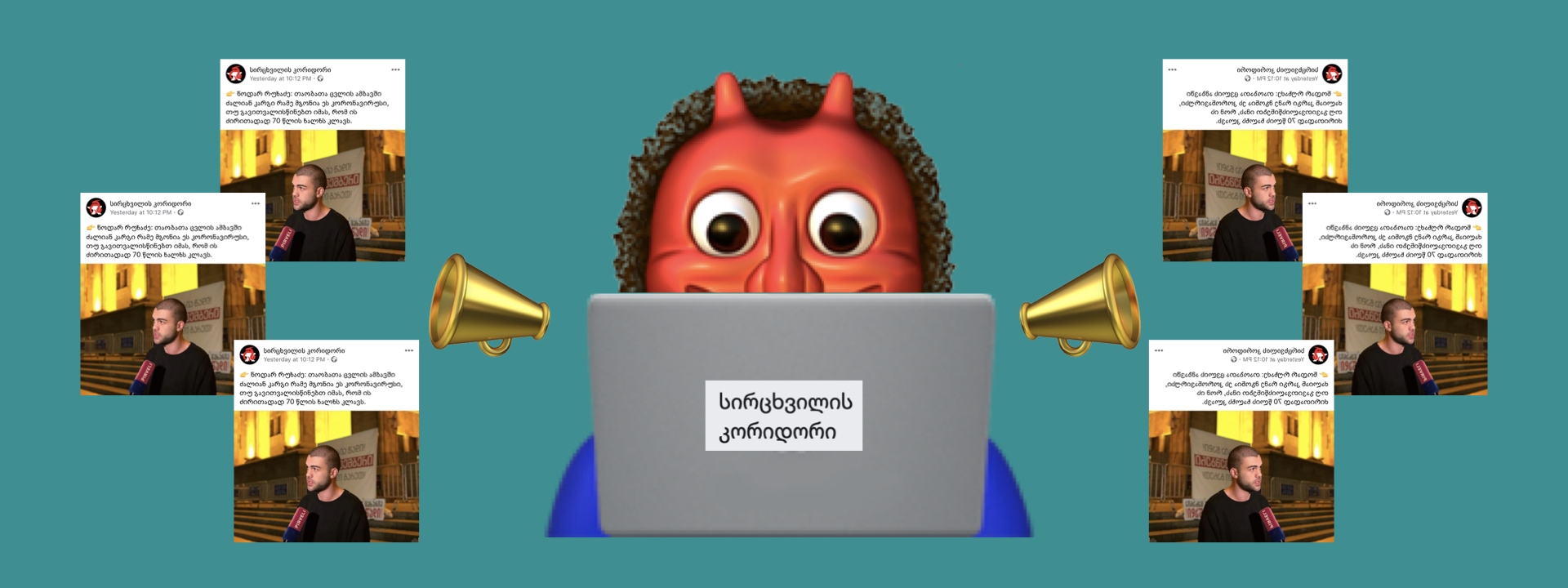Influential Georgian doctor mistakenly amplifies COVID-19 disinfo
Doctor cited fake quote attributed to a democracy activist on a controversial Facebook page
Influential Georgian doctor mistakenly amplifies COVID-19 disinfo

Doctor cited fake quote attributed to a democracy activist on a controversial Facebook page

A prominent Georgian doctor stirred a national debate in the country after repeating a fake quote on TV attributed to a Georgian activist in which the activist was allegedly pleased that the coronavirus would kill the elderly rather than young people. The false quote, originally shared on a controversial Georgian Facebook page, has led to highly divisive discussions across the country.
As the number of people infected with the new coronavirus has increased in Georgia, discussions around the topic have increased alongside it. The widespread nature of the discussion can be illustrated by a search for the word “coronavirus” in Georgian (“კორონავირუსი”) on Facebook. According to the social media monitoring tool Crowdtangle, there were 12,538 separate Facebook posts and more than one million interactions about the virus in March alone, all in a language with only four million speakers worldwide.

The TV interview
There are few doctors and virologists who have been reporting on COVID-19 developments in Georgia on a daily basis. Georgian society has delegated much of its trust and hope in these professionals amid the increasing threat of COVID-19. On March 24, 2020, one of these trusted experts, Dr. Tengiz Tsertsvadze, gave an interview to POSTV in which he said he was horrified that a Georgian pro-democracy activist stated he was glad the coronavirus was killing older people rather than younger ones.
Dr. Tsertsvadze’s remarks became the object of the intense debate across Georgia, and while he didn’t mention the name of the activist, the individual in question — Nodar Rukhadze of the pro-democracy “Shame Movement”— was soon referenced in media coverage. The movement was established in 2019 as a response to a Russian lawmakers’s visit to Georgia and ongoing Russian occupation of parts of the country. The DFRLab has covered how the members of the Shame Movement were targeted by inauthentic Facebook pages, some of which were removed in December 2019, when Facebook deleted up to 400 Georgian pages associated with Georgia’s ruling party.
Four days before Dr. Tsertsvadze’s TV interview, a Georgian Facebook page known as Corridor of Shame posted a photo of Rukhadze, falsely attributing a fake quote to him: “I think the coronavirus is very good in terms of generational change, given that it mainly kills people ages 70 and older.” Treating the quote as fact, Dr. Tsertsvadze repeated it on television during an interview.

The Facebook page Corridor of Shame has been around since 2019, deceiving Georgian society through the spread of disinformation about Georgian opposition parties, activists and media representatives with the goal of discrediting them.

At the time of the analysis, Corridor of Shame had 18,049 likes and 29,160 followers. A CrowdTangle search showed that during March 2020, the Facebook page grew steadily with a sharp increase in the middle of the month.

During the same time period, the page mostly shared photo and video content, with a total of 54,100 interactions.

The page’s post containing the quote falsely attributed to Rukhadze has since been removed, possibly due to calls by many Georgians to report it to Facebook.
Following Dr. Tsertsvadze’s television remarks, Nodar Rukhadze posted on Facebook to explain to him that the quote published by Corridor of Shame was a lie and a disinformation campaign aimed at discrediting him. He also thanked the doctor for his effort to fight the coronavirus in Georgia.

The case has been widely discussed across Georgian social and traditional media. The president of Georgia, Salome Zurabishvili, also joined the debate, but in a perplexing way. She used her personal Facebook account to comment on the case on the Facebook account of Nino Lomjaria, the Public Defender of Georgia, who has sometimes been critical of the president. Lomjaria had shared the video of Dr. Tsertsvadze’s remarks with a caption critical of his remarks: “Disinformation kills.” While President’s comment did not refer to the case itself, she directed it Lomjaria, replying, “Lomjaria has just discovered that [the disinformation kills].” Many Georgians have interpreted the President’s comment as sarcastic remark amid ongoing tensions between Public Defender Lomjaria and the Georgian Government.

The following day, Dr. Tsertsvadze apologized to the Georgian activist in another TV appearance. He said that he saw the post on Facebook and insisted that he had no way of knowing it was false. It is difficult to assess whether Dr. Tsertsvadze’s apology reached everyone who heard his condemnation of the activist during his initial TV appearance. As is often the case with disinformation, once a message has spread — especially a damning one — it is always challenging to debunk it for everyone originally exposed to it.
The Georgian activist’s case is a classic example of how online disinformation can suddenly move into the offline dimension, often having unpredictable or potentially dangerous consequences. And when disinformation specifically targets individuals such as pro-democracy activists, it can lead to undeserved public condemnation — which was very likely the intention of the Facebook page when it circulated the fake quote in the first place.
Follow along for more in-depth analysis from our #DigitalSherlocks.

